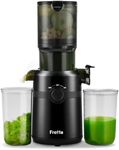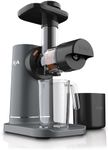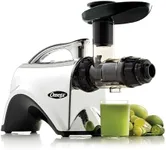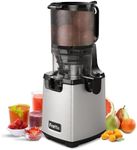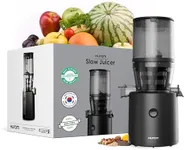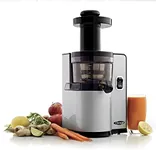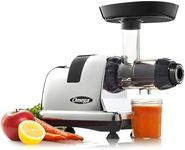Buying Guide for the Best Cold Press Juicer Machine
Choosing a cold-press juicer machine can be a rewarding decision if you want to enjoy fresh, nutrient-rich juices at home. Cold-press juicers, also known as masticating juicers, work by slowly crushing and pressing fruits and vegetables to extract juice, which helps preserve more vitamins and enzymes compared to traditional juicers. When picking the right one, it's important to consider how often you'll use it, what types of produce you want to juice, and how much space you have in your kitchen. Understanding the key features will help you find a juicer that fits your lifestyle and juicing habits.Juicing Speed (RPM)Juicing speed, measured in revolutions per minute (RPM), tells you how fast the juicer's auger turns. Lower speeds (typically 40-80 RPM) are better for preserving nutrients and minimizing heat, which is ideal for those who want the healthiest juice possible. Higher speeds (over 100 RPM) can process juice faster but may generate more heat and oxidation, which can reduce the nutritional value. If you prioritize maximum nutrition and don't mind waiting a bit longer, go for a lower RPM. If speed is more important for your busy mornings, a slightly higher RPM might suit you better.
Feed Chute SizeThe feed chute is the opening where you insert fruits and vegetables. A larger feed chute allows you to put in bigger pieces or even whole produce, saving you time on chopping. Smaller chutes require more prep work, as you'll need to cut your ingredients into smaller pieces. If you value convenience and want to spend less time prepping, look for a juicer with a wide feed chute. If you don't mind a bit of extra prep or have limited counter space, a smaller chute can work just fine.
Juice YieldJuice yield refers to how much juice the machine can extract from a given amount of produce. Higher juice yield means less waste and more juice from your fruits and vegetables. Some juicers are more efficient with leafy greens, while others excel with hard fruits and vegetables. If you plan to juice a lot of greens or want to get the most out of your produce, look for a model known for high juice yield. If you mostly juice fruits or don't mind a bit of leftover pulp, this may be less critical.
Ease of CleaningCleaning a juicer can be a chore, so it's important to consider how easy it is to take apart and wash the parts. Some juicers have fewer components and are dishwasher-safe, making cleanup quick and simple. Others may have more intricate parts that require hand washing. If you want to juice regularly, an easy-to-clean model will encourage you to use it more often. If you only plan to juice occasionally, you might be willing to spend a bit more time on cleanup.
Noise LevelCold-press juicers are generally quieter than traditional centrifugal juicers, but noise levels can still vary. If you live in a shared space, have young children, or prefer a quieter kitchen, look for a model known for low noise. If noise isn't a concern for you, this spec may not be as important.
Size and StorageJuicers come in various sizes, from compact models to larger machines. Consider how much counter or storage space you have in your kitchen. If you have limited space, a smaller or vertical model might be best. If you have plenty of room and plan to juice large quantities, a bigger machine could be more efficient.
Material QualityThe materials used in a juicer affect its durability and safety. Stainless steel and BPA-free plastics are common and safe for food contact. Higher-quality materials usually mean a longer-lasting machine. If you plan to use your juicer frequently, investing in a model with sturdy, high-quality materials is wise. For occasional use, material quality may be less of a concern.
